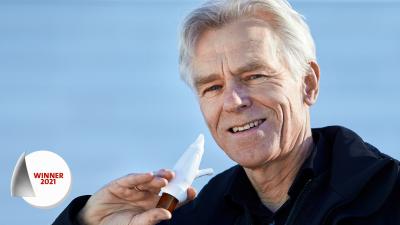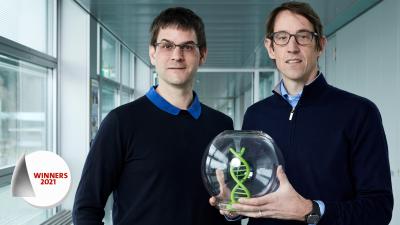Marco Donolato and team
Magnetic nanoparticles to diagnose disease
Finalists for the European Inventor Award 2021
In resource-poor settings around the world, many people are unable to receive diagnosis or treatment for infectious diseases because they cannot reach a clinic either due to cost or geography. This makes them more likely to die from treatable conditions and spread disease in their communities. Dengue fever is a mosquito-borne viral disease that infects nearly 400 million people per year, but early detection and access to adequate medical care can reduce death rates from 20% to below 1%. However, conventional tests take several hours and require specialised staff and facilities.
Marco Donolato first had the idea of using magnetic nanoparticles (MNPs) to diagnose disease while working in the laboratory of Professor Mikkel Fougt Hansen, a physicist specialising in magnetic nanoparticle research, at the Technical University of Denmark. He also spent time working with electronic engineer and optics expert Professor Paolo Vavassori of CIC nanoGUNE in Spain. By combining his knowledge of nanoparticles with what he had learned about optics, Donolato and his team went on to develop a test that uses MNPs and an optical reader like those found in standard Blu-ray players. The invention includes a ViroTrack cartridge containing MNPs coated with antibodies related to the disease for which the patient is being tested. This cartridge is inserted into a BluBox optical reader, which uses blue laser technology and an oscillating magnetic field to determine if the disease is present from the patterns created by the MNPs. The patented testing system detects and quantifies the amount of a virus from a single drop of blood from a patient's fingertip in around 10 minutes. It is automated, easy-to-use for non-specialists and inexpensive - all factors that make it ideal for use in remote or rural settings in developing countries.
Fighting disease today and in the future
Donolato's invention was commercialised through BluSense Diagnostics, the start-up he co-founded with Hansen and Vavassori in 2014. Today, the company has more than 60 employees and has raised over EUR 15 million in funding. To support its work, a second company, BluSense Biotech® was established in Taiwan in 2015, and focuses on developing the necessary hardware and software for the BluBox device.
Donolato is the company's chief scientific officer and has overseen the successful commercialisation of his patented system for use against dengue infections in Vietnam, Thailand and Malaysia. A test has been developed for the Zika virus, with others in progress for chikungunya, yellow fever and West Nile fever. In response to the current pandemic, the company is also working on a new product to measure a patient's antibody response to COVID-19 in just five minutes.
Media gallery
Patent numbers:
Contact
European Inventor Award and Young Inventors Prize queries:
european-inventor@epo.org Subscribe to the European Inventor Award newsletterMedia-related queries:
Contact our Press team#InventorAward #YoungInventors








